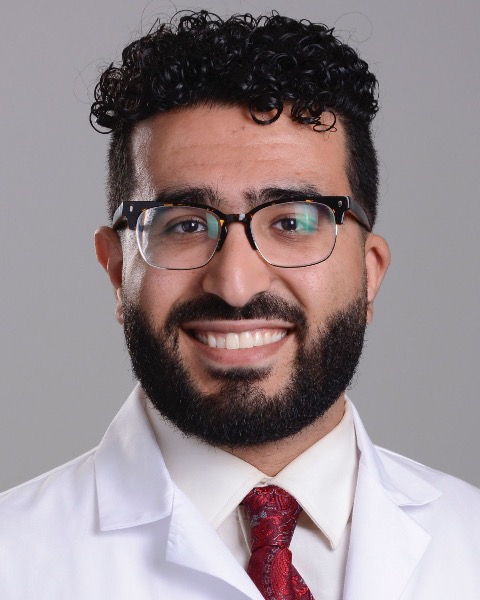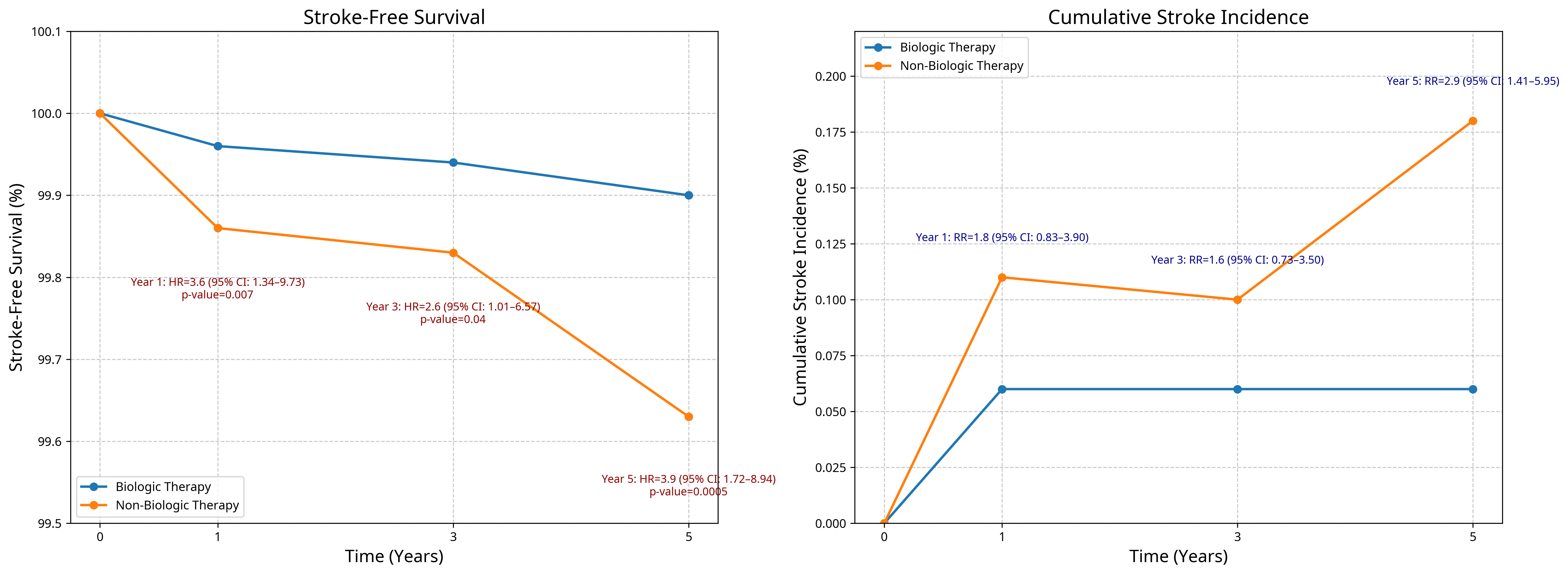Monday Poster Session
Category: IBD
P3306 - Long-Term Risk of Stroke in Inflammatory Bowel Disease Patients: A Comparative Study of Biologic vs Non-Biologic Therapy
Monday, October 27, 2025
10:30 AM - 4:00 PM PDT
Location: Exhibit Hall

Omar Arman, MD, MPH
University at Buffalo
Depew, NY
Presenting Author(s)
Omar Arman, MD, MPH1, Khaled Rafeh, MD2, Kamal Hamad, MD3, Laith M.. Haj-Ahmad, MD4, Hossam AlNoaimi, MD5, Mazen Zamzam, BS6, Jad Bou-Abdallah, MD1
1University at Buffalo, Buffalo, NY; 2School of Medicine, The University of Jordan, Shmeisani, 'Amman, Jordan; 3Jordan University of Science and Technology, Irbid, Irbid, Jordan; 4University of Jordan, Amman, 'Amman, Jordan; 5The Hashemite University, Zarqa, Az Zarqa', Jordan; 6Oakland University William Beaumont School of Medicine, Royal Oak, MI
Introduction: Inflammatory bowel disease (IBD) is associated with systemic inflammation, increasing stroke risk via elevated cytokines, endothelial dysfunction, and hypercoagulability. Biologic therapy may reduce this risk by effectively controlling inflammation, yet comparative data on stroke outcomes in biologic vs. non-biologic IBD therapies remain limited. This study aimed to assess whether biologic therapy reduces stroke risk compared to non-biologic therapy over 1, 3, and 5 years.
Methods: Using the TriNetX Research Network, we analyzed electronic medical records from 225,303 patients across 94 healthcare organizations. Adults (≥18 years) with Crohn’s disease or ulcerative colitis were included, excluding those with prior stroke, myocardial infarction, heart failure, or significant arrhythmias. Patients were stratified into biologic vs. non-biologic cohorts and propensity score-matched on demographics, comorbidities, and disease severity. Final matched cohorts included N=16,179 (1-year), N=16,181 (3-year), and N=15,821 (5-year). The primary outcome was stroke incidence. Kaplan-Meier survival estimates and hazard ratios (HRs) with 95% confidence intervals were also reported.
Results: Over the 5-year period, the non-biologic cohort demonstrated progressively worsening stroke outcomes. At 1 year, stroke incidence was 0.11% (18 cases) in non-biologic vs. 0.06% (10 cases) in biologic patients (RR=1.8, 95% CI: 0.83-3.9); while not statistically significant, Kaplan-Meier curves showed significantly lower stroke-free survival in non-biologic patients (99.86% vs 99.96%; p=0.007; HR=3.6, 95% CI: 1.34-9.73). At 3 years, stroke incidence was 0.10% (16 cases) vs 0.06% (10 cases) (RR=1.6, 95% CI: 0.73-3.5) with continued survival disadvantage (99.83% vs 99.94%; p=0.04; HR=2.6, 95% CI: 1.006-6.574). By 5 years, the non-biologic group had triple the stroke incidence 0.18% (29 cases) vs 0.06% (10 cases) (RR=2.9, 95% CI: 1.41-5.95), with significantly poorer stroke-free survival (99.63% vs 99.90%; p=0.0005; HR=3.9, 95% CI: 1.72-8.94).
Discussion: Biologic therapy is associated with significantly reduced long-term stroke risk in IBD patients. The effect grows over time, with marked differences emerging at 5 years. These findings highlight the potential of biologics to reduce stroke risk in IBD by controlling systemic inflammation. Prospective studies are needed to confirm causality and clarify underlying mechanisms with regard to the progressive temporal divergence in the statistical significance observed.

Figure: Figure 1. Stroke-Free Survival and Cumulative Stroke Incidence in IBD Patients: Biologic vs. Non-Biologic Therapy are displayed. Left panel: Kaplan-Meier curves for stroke-free survival (%). Annotations show Hazard Ratios (HR), 95% Confidence Intervals (CI), and p-values for non-biologic vs. biologic therapy at 1, 3, and 5 years. Right panel: Cumulative stroke incidence (%). Annotations show Relative Risks (RR) and 95% CIs for non-biologic vs. biologic therapy at 1, 3, and 5 years.
Disclosures:
Omar Arman indicated no relevant financial relationships.
Khaled Rafeh indicated no relevant financial relationships.
Kamal Hamad indicated no relevant financial relationships.
Laith Haj-Ahmad indicated no relevant financial relationships.
Hossam AlNoaimi indicated no relevant financial relationships.
Mazen Zamzam indicated no relevant financial relationships.
Jad Bou-Abdallah indicated no relevant financial relationships.
Omar Arman, MD, MPH1, Khaled Rafeh, MD2, Kamal Hamad, MD3, Laith M.. Haj-Ahmad, MD4, Hossam AlNoaimi, MD5, Mazen Zamzam, BS6, Jad Bou-Abdallah, MD1. P3306 - Long-Term Risk of Stroke in Inflammatory Bowel Disease Patients: A Comparative Study of Biologic vs Non-Biologic Therapy, ACG 2025 Annual Scientific Meeting Abstracts. Phoenix, AZ: American College of Gastroenterology.
1University at Buffalo, Buffalo, NY; 2School of Medicine, The University of Jordan, Shmeisani, 'Amman, Jordan; 3Jordan University of Science and Technology, Irbid, Irbid, Jordan; 4University of Jordan, Amman, 'Amman, Jordan; 5The Hashemite University, Zarqa, Az Zarqa', Jordan; 6Oakland University William Beaumont School of Medicine, Royal Oak, MI
Introduction: Inflammatory bowel disease (IBD) is associated with systemic inflammation, increasing stroke risk via elevated cytokines, endothelial dysfunction, and hypercoagulability. Biologic therapy may reduce this risk by effectively controlling inflammation, yet comparative data on stroke outcomes in biologic vs. non-biologic IBD therapies remain limited. This study aimed to assess whether biologic therapy reduces stroke risk compared to non-biologic therapy over 1, 3, and 5 years.
Methods: Using the TriNetX Research Network, we analyzed electronic medical records from 225,303 patients across 94 healthcare organizations. Adults (≥18 years) with Crohn’s disease or ulcerative colitis were included, excluding those with prior stroke, myocardial infarction, heart failure, or significant arrhythmias. Patients were stratified into biologic vs. non-biologic cohorts and propensity score-matched on demographics, comorbidities, and disease severity. Final matched cohorts included N=16,179 (1-year), N=16,181 (3-year), and N=15,821 (5-year). The primary outcome was stroke incidence. Kaplan-Meier survival estimates and hazard ratios (HRs) with 95% confidence intervals were also reported.
Results: Over the 5-year period, the non-biologic cohort demonstrated progressively worsening stroke outcomes. At 1 year, stroke incidence was 0.11% (18 cases) in non-biologic vs. 0.06% (10 cases) in biologic patients (RR=1.8, 95% CI: 0.83-3.9); while not statistically significant, Kaplan-Meier curves showed significantly lower stroke-free survival in non-biologic patients (99.86% vs 99.96%; p=0.007; HR=3.6, 95% CI: 1.34-9.73). At 3 years, stroke incidence was 0.10% (16 cases) vs 0.06% (10 cases) (RR=1.6, 95% CI: 0.73-3.5) with continued survival disadvantage (99.83% vs 99.94%; p=0.04; HR=2.6, 95% CI: 1.006-6.574). By 5 years, the non-biologic group had triple the stroke incidence 0.18% (29 cases) vs 0.06% (10 cases) (RR=2.9, 95% CI: 1.41-5.95), with significantly poorer stroke-free survival (99.63% vs 99.90%; p=0.0005; HR=3.9, 95% CI: 1.72-8.94).
Discussion: Biologic therapy is associated with significantly reduced long-term stroke risk in IBD patients. The effect grows over time, with marked differences emerging at 5 years. These findings highlight the potential of biologics to reduce stroke risk in IBD by controlling systemic inflammation. Prospective studies are needed to confirm causality and clarify underlying mechanisms with regard to the progressive temporal divergence in the statistical significance observed.

Figure: Figure 1. Stroke-Free Survival and Cumulative Stroke Incidence in IBD Patients: Biologic vs. Non-Biologic Therapy are displayed. Left panel: Kaplan-Meier curves for stroke-free survival (%). Annotations show Hazard Ratios (HR), 95% Confidence Intervals (CI), and p-values for non-biologic vs. biologic therapy at 1, 3, and 5 years. Right panel: Cumulative stroke incidence (%). Annotations show Relative Risks (RR) and 95% CIs for non-biologic vs. biologic therapy at 1, 3, and 5 years.
Disclosures:
Omar Arman indicated no relevant financial relationships.
Khaled Rafeh indicated no relevant financial relationships.
Kamal Hamad indicated no relevant financial relationships.
Laith Haj-Ahmad indicated no relevant financial relationships.
Hossam AlNoaimi indicated no relevant financial relationships.
Mazen Zamzam indicated no relevant financial relationships.
Jad Bou-Abdallah indicated no relevant financial relationships.
Omar Arman, MD, MPH1, Khaled Rafeh, MD2, Kamal Hamad, MD3, Laith M.. Haj-Ahmad, MD4, Hossam AlNoaimi, MD5, Mazen Zamzam, BS6, Jad Bou-Abdallah, MD1. P3306 - Long-Term Risk of Stroke in Inflammatory Bowel Disease Patients: A Comparative Study of Biologic vs Non-Biologic Therapy, ACG 2025 Annual Scientific Meeting Abstracts. Phoenix, AZ: American College of Gastroenterology.
